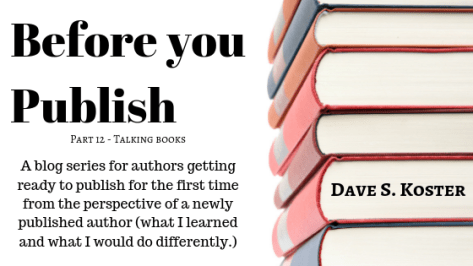
It’s now almost two weeks after The Dark Queen of Darkness hit the world. This was a project some 4 years in the making. It’s an accomplishment, to be sure, and now it’s time to answer the question, ‘what now?’ It seems like it should be easy: Write another book! Practically speaking, that’s a back-burner project, but generally something I’m moving forward as I can. That said, before I can focus on getting Book 2 of the “Basket Case Files” rolling or perhaps finally get Deep Space Engineering Helpdesk in some sort of condition to publish, I need to do some other things first.
The first thing I need to work on is marketing. This is not something I understand well and haven’t had any real success at, though I’m starting to develop some strategies. Really though, the most important thing I need to do is share my experience for the benefit of my writer friends. I always feel that going forward is more straight-forward if I can see what other folks have gone through first. When I first launched into the publication of my second book, I thought that by getting Wine Bottles and Broomsticks out the door first, I’d have a handle on what to do the next time out. That could not have been further from the truth. This particular experience was a LOT harder than the first time. While that was a bit unexpected, the results boil down to the following:
- Better produced book (cover, editing, layout etc…),
- Better visibility,
- Sales are comparable to Wine Bottles and Broomsticks (so far),
- I’m more satisfied with this work than my previous launch.
To stay brief, this post kicks off a continuation of my series on publishing insights from an indie author. Now that I’ve done this twice, I’ve not only had twice the experience but also learned twice as much as the first time around. As I did with my first book, I’m going to try to recap some of the things I did, why I did them that way, what I learned, and what I’d do differently. Rather than being a checklist of what you NEED to do before publishing like the first part of this series, I’ve got items to talk about that are more in the realm of ‘optional’ things. Most of these are not strictly necessary to self-publish, but they’re absolutely part of the landscape. The point is to relay how these worked out for me, how I might approach differently and my recommendation for anyone looking into it. I will also be reaching out to other authors to get their perspectives throughout this series.
Here are some of the topics I’ll cover; hopefully, I’ll be able to get one out each week.
- Hiring contractors – what to expect,
- Setting up your release date,
- Creating an imprint,
- Cover Design,
- Internal layout,
- Marketing and advertising,
- ISBNs,
- Copyright registration,
- IngramSpark,
- Barnes & Noble,
To accompany this series, I also plan to do a YouTube series on InDesign specifically for indie writers, once it launches (sometime in late March or early April 2020), they will be a set of 5-10 minute videos on:
- Why InDesign, how to set up your project, and general book layout considerations,
- Placing your material in InDesign,
- Page masters & why it matters,
- Styles explained,
- Dealing with Images,
- A bit of jargon and cleaning up the layout,
- Final check on page-masters, styles, layouts and overall look,
- Export settings,
- Formatting for ePub – Table of Contents,
- Formatting for ePub – Using Styles to organize your book,
- Exporting for ePub,
- Exporting for .mobi (kindle).
So that’s where I’m headed. If you’re interested, just keep an eye on this blog or follow me on Twitter @daveskoster. If you want a signed paper copy, they’ll be available locally in Wasilla and Anchorage or find me on social media and maybe we can figure out something with Venmo.


